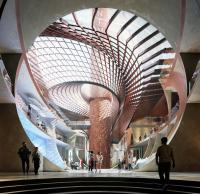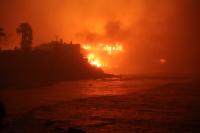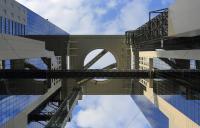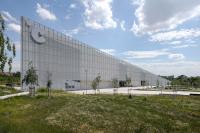Mesh House
Linz, Austria
A generous green roof as a cut-out and folded-up landscape forms the largest space-creating element of the house. The lightweight wood construction with a rear-ventilated metal façade and large-scale glass elements form the remaining outer skin surfaces. The intersection of the massive terrace plateau with the edge of the terrain forms only a partial adaptation to the topography, therefore the structure rises from the terrain on the north/west side.
The vegetation layer removed by the excavation was returned to the landscape on the roof.
The heart of the house is the partly five-meter-high, ground-level living space, from which all rooms, the garden and the terrace plateau with the pool are accessed. As a structurally shielded space, the tent-like sleeping and resting area is located on the upper floor and is connected to the roof terrace by a cut in the green roof. Rooms and surfaces flow into one another. Be it the open fireplace on three sides between the living room and the workroom, which grows out of the wall lining and allows a view through the combustion chamber into the study, or the concrete floor and the soffit of the roof, both of which continue from the inside to the outside through the frameless glass façade. The incorporation of nature and surroundings is further emphasized by these outward flowing transitions.
The entire construction of the house was made of a lightweight timber frame construction, combined with partially visible steel construction. The floor slab in contact with the ground is of solid concrete construction and also forms the finished, polished and waxed floor surface. It also serves as a storage mass element, balancing the light roof structure. The building climate is also regulated by the large green roof area, it serves as structural solar and thermal protection in the southwest, favored by its thick vegetation layer. The vertical façade is back-ventilated by an aluminum-natural corrugated metal façade suspended on a wooden structure.
The use of untreated wood as building material for parts of the interior, raw untreated corrugated aluminum sheet for the facade, or planted roofing underlines the sustainable and efficient concept of the building.





















